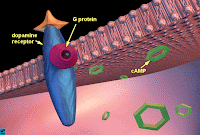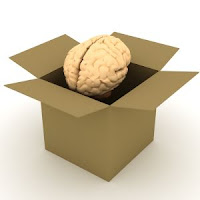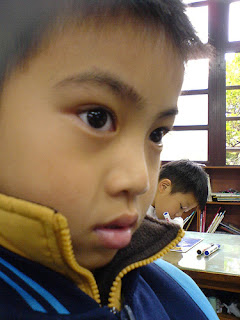I’ve spent the entire month of December commenting on ADD. I neither think it’s a disorder nor do I see the current medical treatment for this non-disorder as being on track in any capacity. So what would be my solution? Well, I always say that ADD is just another way of saying “genius”. Inside every person lies a genius–the secret is to find and nurture what that genius is.
Studies have shown that highly creative people have a greater propensity for mental illness in their families. No surprises there, as many have the perception that creative genius and mental disorders go hand-in-hand–think Vincent van Gogh. A recent Swedish study, however, has shown that highly creative healthy people have similar brain chemistry features as schizophrenics.
The similarities are in the levels of dopamine receptor activity in the thalamus (the area responsible for sorting information before it reaches conscious thought). People in the study that had the lowest dopamine receptor activity also had the greatest ability for divergent thinking (e.g. finding many solutions to a problem). Previous studies have also shown that schizophrenics have lower dopamine activity in the thalamus. But more importantly, who sees the connection to ADD?
 If the current thought on the pathophysiology of ADD is correct, then the brain of an affected individual also has diminished dopamine levels.
If the current thought on the pathophysiology of ADD is correct, then the brain of an affected individual also has diminished dopamine levels.
Disorder?…or genius?
I’m not making a statement on whether the current thought on dopamine levels in ADD is right or wrong. I am simply making the point that we do not yet know every working detail of the brain. Treating what is seen today as a brain disorder with very powerful drugs has to have ramifications. And when we consider that this pharmaceutical treatment is being tested on our children (you better believe the kids are guinea pigs—read my previous posts…and here….and here), it makes anyone wonder how this must be affecting and shaping the developing brain. I’m sorry, but I just can’t advocate this kind of experimentation on children.
I contend that having an attention deficit is common to all people at one time or another—no health professional or serious thinker will dispute this fact. The question, then, is whether the ADD-labeled child actually has a “disorder” that is disrupting his or her life.
Answering this question really takes thinking outside the box. Consider that we are all, to one degree or another, subordinate to societal norms and parameters. But norms change. Case in point: Fifty years ago it would have been unheard of for cursing to be a viable part of mainstream communication. To do so repeatedly might have led the cursor to be branded with his own diagnosis of mental illness. Today, however, cursing is not only “in”, it appears to be making great strides within the mainstream, inserting itself into the common language.
My point is this: Yesterday’s norm is today’s old-fashioned behavior. Staying focused in a 19th-century classroom setting is hardly a virtue today. Education is bound to change as we have seen gross inadequacies of our educational system. Perhaps then we will see that children who are currently considered problems in the classroom simply have a different way of learning. Perhaps they are inspired by things not taught in the classroom—that was most definitely my experience up until college.
 Perhaps your ADD-labeled child is a genius musician, or welding artist, or skateboarder, or party promoter, or social networker, or computer programmer, or business person, or something else we don’t even know exists yet. How will we freakin’ know if we numb and shape our children’s brains with hard-core drugs?
Perhaps your ADD-labeled child is a genius musician, or welding artist, or skateboarder, or party promoter, or social networker, or computer programmer, or business person, or something else we don’t even know exists yet. How will we freakin’ know if we numb and shape our children’s brains with hard-core drugs?
I’ve avoided attacking parents in these posts because I understand how difficult it must be to make decisions when the cultural health authority dictates how it is. But, now, I must say: Parents, why would you even consider giving any mind-altering drug to your child when you don’t know how it might affect their brains in the long-term? Why would this even be a consideration? Is it because you don’t know what else to do? I’ll accept that. But you’re reading this now; and if you haven’t read the previous posts, then please do so. If it comes down to the choice between tampering with your child’s brain or doing everything you can to tap into his or her hidden genius, then c’mon…is this really a difficult choice?
 Every child has a genius inside waiting to be expressed. Some know it from day one, but most of us have to find ours. It can be a godawful labor trying to focus on something that…is…just…as…interesting…as…a bag of rocks (which is certainly interesting to a geologist!). Help your child find his or her genius—it’s there! Then relate all academic material to their inspiration, their loves. I guarantee that your child will be able to focus when seeing how it relates to what he or she loves. Just as every person has trouble focusing at one time or another, every ADD-labeled kid has things that they do that present no attention problems whatsoever—this is also an indisputable fact.
Every child has a genius inside waiting to be expressed. Some know it from day one, but most of us have to find ours. It can be a godawful labor trying to focus on something that…is…just…as…interesting…as…a bag of rocks (which is certainly interesting to a geologist!). Help your child find his or her genius—it’s there! Then relate all academic material to their inspiration, their loves. I guarantee that your child will be able to focus when seeing how it relates to what he or she loves. Just as every person has trouble focusing at one time or another, every ADD-labeled kid has things that they do that present no attention problems whatsoever—this is also an indisputable fact.
I hope these posts have given you adequate information to make good decisions. Remember that ADD is just another term for “untapped genius”. Next post, we’ll see some people that have done something with their lives despite being labeled ADD. Your ADD-labeled kid may just be the next one on that list.

















